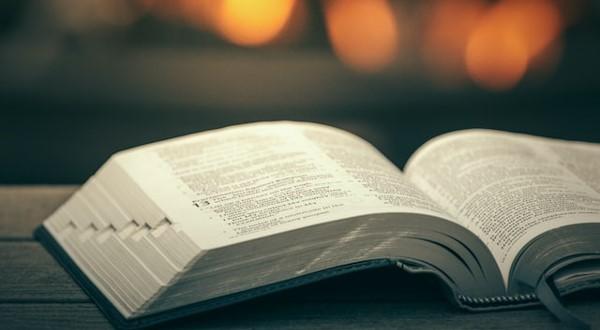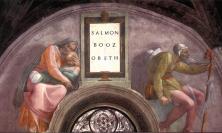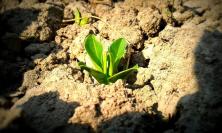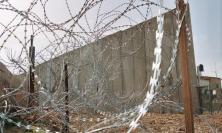Peter Edmonds SJ reflects on the weekday readings for the first week of Advent.
(The dates in brackets refer to the year 2022.)
Monday (28 November): Restoration
(Isaiah 4:2-6 [Year A]; Matthew 8:5-11)
‘Many will come from east and west to take their places with Abraham and Isaac and Jacob at the feast in the kingdom of heaven.’ (Matthew 8:11)
Poems written by the prophet Isaiah provide the first reading in most of our daily weekday Masses in Advent. The gospel readings help us reread his prophetic visions in the light of Christ. Today Isaiah urges his hearers in Jerusalem to cease brooding on the threats posed by the superpowers of the day and to treasure instead God's promises to Zion, another name for Jerusalem, a word that signifies peace. His language reminds them of God’s favours to their ancestors in the past. He had led them in their desert journey from Egypt by providing a cloud to guide them by day and a blazing fire by night. The glory of the Lord would continue to give them shade and refuge.
Jesus, according to Matthew, had an even wider vision. The faith displayed by the gentile centurion, whose slave he cured, made him view the nations of the wide world taking their place with Jacob in his Father’s kingdom. His gospel began with the Magi coming from afar to worship the new-born child. It would end with his commissioning his disciples after the resurrection to make disciples of all the nations.
The season of Advent is a time for us, too, to broaden our vision. Let us have confidence in a God who is always busy and active on behalf of us all. God is the God who restores what is broken. Let us extend our horizons to see what God sees. May we seek to embrace the ways of peace rather than conflict.
Prayer
Father, you are a God who restores what has been shattered. Help us to recognise what has been shattered in our lives and communities, so that we may share and cooperate in your work of restoration which leads to life in your Kingdom, through Christ our Lord.
Tuesday (29 November): Responsible leadership
(Isaiah 11:1-10; Luke 10:21-24)
‘I bless you, Father, Lord of heaven and earth, for hiding these things from the learned and the clever and revealing them to mere children.’ (Luke 10:21)
One contrast between the leaders of past ages and those of today’s world is the ease of communication which they enjoy. Personal conversations take place instantaneously and they can meet anywhere on the planet with a minimum of inconvenience. But problems remain. Leaders vary in quality, lose the confidence of their people and fall from office.
Isaiah wrote during a time of fickle and unreliable leaders and this led him to long for a king who would possess the leadership qualities of King David, the greatest of Israel’s kings. These are summed up in his poem which we read today. These describe a king far greater than David, and encourage us to look at the person of Jesus instead. He was the one in whom the gifts of the spirit found full scope. His life and teaching embodied the righteousness and faithfulness of God. In the fullness of the kingdom he proclaimed, the conditions of paradise would return. When Jesus prayed to the Father, he rejoiced in the Spirit and thanked God. Because he was the king who best fitted Isaiah’s blueprint, he rejoiced that ‘mere children’ had a special share in the gifts which God offered through him, and blessed his disciples because of what they saw and heard in his words and deeds.
We are to choose leaders whom we can trust to reflect the values embodied in the person of Jesus, and we are challenged to live up to these values ourselves when we exercise responsibility for the common good and the good of others.
Prayer
Lord, we see many problems as we look around our world. We pray for good leadership in all spheres of society after the pattern of Jesus, so that the vision of the Kingdom of God which he had, may be our vision too. We ask this through Christ our Lord.
Wednesday (30 November): Banquet
(Isaiah 25:6-10; Matthew 15:29-37)
‘They all ate as much as they wanted, and they collected what was left of the scraps, seven baskets full.’ (Matthew 15:37)
Our city centres abound in high class restaurants. People love eating quality food in pleasant surroundings. They enjoy good conversation and feelings of well-being. Family life benefits when its members eat together, because they get to know and understand one another better. But behind all this conspicuous consumption is the knowledge that many in our world are hungry for the most basic food stuffs.
Isaiah’s vision of the plans of God for his people included food in plenty. This image of food and wine was potent in a land of desert and drought. God himself would be the host at the banquet. The gospels give us several accounts of Jesus’s feeding crowds. These looked back to the feeding of Israel with manna during their desert journey and looked forward to the Eucharist which Christians have celebrated from the beginning. In the passage from Matthew’s Gospel read today, Jesus has just cured the daughter of the Syro-Phoenician woman who asked for the crumbs falling from the table. In feeding 4,000, Jesus anticipated the banquet promised by Isaiah. The seven baskets left over proved that there was plenty for everybody. God feeds us with all generosity. He is the good shepherd of today’s psalm.
We pray each day for our daily bread. Our hunger is to be for the Eucharist and the Word of God. This bread is to lead to mutual growth and knowledge, for we belong to the family of God. It also helps us develop a social conscience that remembers the needy.
Prayer
Lord, teach us to hunger and thirst for the right things in our lives and help us to feed the world not just with material food, but with everything that assists its people live lives that God, its creator and redeemer, wants them to live. Through Christ our Lord.
Thursday (1 December, the feast of Ss Edmund Campion SJ, Robert Southwell SJ & Companions): Rock solid
(Isaiah 26:1-10; Matthew 7:21, 24-27)
‘Gales blew and hurled themselves against that house, and it did not fall, it was founded on rock.’ (Matthew 7:25)
Good shops provide warranties, promise refunds, guarantee their products. Good banks do not lose our money. We look for peace of mind in our daily activities and commitments, so that we can live out our lives without tension and anxiety. Ultimately this peace of mind is a gift of God, as Augustine knew: ‘Our hearts are restless until they rest in you’.
Isaiah’s poem today is a meditation on the qualities of God. The prophet envisages God as living in a strong city, and to enjoy the qualities of his peace, we must enter into that city through the gate that gives entrance. In the depths of our hearts, we long for such a God and we are only content when we live by the ideals which define his character, which we call his righteousness. Many ancient cities were built on a rock and this is a key word in the conclusion of Jesus’s Sermon on the Mount, in Matthew. God is the rock on which we must build our lives and the Sermon on the Mount offers us a programme that will make us feel at home as we strive to live lives worthy of the kingdom of God.
In today’s ‘throw-away’ society and in a world in which long-term commitments are hard to come by, it is good to reflect on our image of God and to contrast it with that of the prophets. They knew that however unreliable human institutions were, behind them was a rock-like God. In him, says the psalm of today, we are to take refuge.
Prayer
Lord, let us seek solid foundations in our lives, so that we may not be blown around by every tiny breeze. May we recognise in ourselves the longing for God with which we were created, and live out our days in ways that reflect it. Through Christ our Lord.
Friday (2 December): Blind see and deaf hear
(Isaiah 29:17-24; Matthew 9:27-31)
‘Then he touched their eyes saying, “Your faith deserves it, so let this done for you.”’ (Matthew 9:29)
Years ago, there was great excitement in Central Africa. The age of passenger aircraft had arrived. But there was a big snag. These new machines could not travel at night. They were blind, and they were deaf too in those days of primitive radios. Technological progress of course solved the problem and these days, seeing and hearing is no problem.
In today’s poem from Isaiah, the prophet looks to the future with an eye on the past. He is confident in a God who brings good out of evil, a God who restores and repairs. The Lebanon that had been threatened because of her sin is now promised fertility and an abundance of crops. The people that had been pronounced blind and deaf is now promised sight and hearing. Promises that God had made long ago to the patriarchs, Abraham and Jacob, still stood, despite Israel’s obstinacy. Matthew tells us how in his ministry, Jesus confirmed the accuracy of Isaiah’s prediction. The two blind men whom he cured illustrate the sight God was giving his people through him. They called him Son of David, because they saw in Jesus the fidelity of God in action. He was indeed, in the words of the psalm of today, their light and salvation.
We live today in a secularised world which often ignores the existence of God and does not recognise God’s activity. Through hearing again the words of the prophets and imagining ourselves present at the deeds of Jesus, we are to see and hear how God continues God’s loving work in the people, places and events of our own time.
Prayer
Lord, make us aware of your achievements on our behalf. You have always been and will be faithful to each of us, your people. Enlighten our eyes and enable our ears, so that we see and hear your activity in our lives and in our world. Through Christ our Lord.
Saturday (3 December, the feast of St Francis Xavier SJ): The Lord binds up injuries
(Isaiah 30:19-21, 23-26; Matthew 9:35-10:1, 6-8)
'And when he saw the crowds he felt sorry for them because they were harassed and dejected.' (Matthew 9:36)
Isaiah continues his message of consolation to his people who were suffering the afflictions of exile, a people that has fed on ‘the bread of adversity and the water of affliction’. God is now their teacher and their guide. His voice is telling them the way forward. Once again oxen and donkeys will be hard at work in their fields; drought will be a thing of the past. God is healing his people. Isaiah is preaching good news.
Before he preached his Sermon on the Mount, Matthew summed up the activity of Jesus; he was teaching in the synagogues, preaching the gospel of the kingdom and healing every disease. The prophetic words of Isaiah were becoming a reality. Now with the Sermon on the Mount completed and a series of miracles performed, Matthew repeats his summary of Jesus’s mission but now there is a difference. He is assembling labourers for his harvest. He appoints his twelve apostles and sends them out to make his mission their mission, too.
Frequently in Matthew’s Gospel, the disciples of Jesus are portrayed as models. His readers are not only to admire them but to imitate them, too. They foreshadow members of the future Church of Christ in every age including our own. We pray today that each of us may recognise our own vocation to be an agent of the compassion of Christ in our own world. We are sent to proclaim Christ’s message to our world that: ‘The kingdom of heaven has come near’.
Prayer
Father, in Advent we hear again the good news of salvation proclaimed by the prophets, and its fulfilment in the life of your Son and in the mission of the apostles. May we become labourers in their harvest and agents of the kingdom in our world. Through Christ our Lord.






